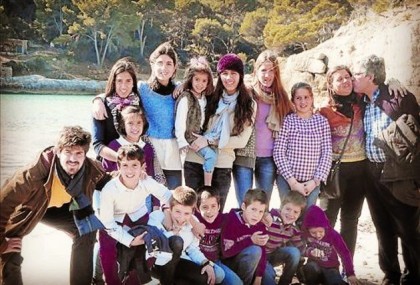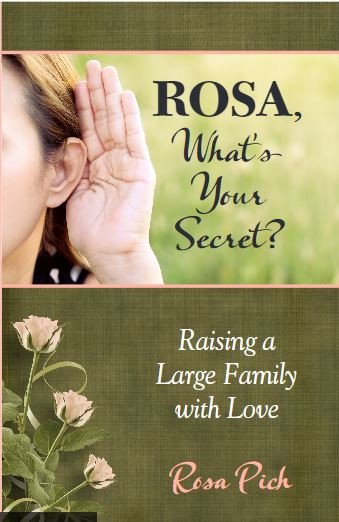Rosa Pich, Widowed Mother of Eighteen
Devra Torres | Mar 15, 2017
Our friend Rosa lost her husband Chema the other day. Together they have eighteen children. I wrote about Chema here, but his story is incomplete without hers.

When we first knew Rosa and Chema (during our family's decade in Barcelona), we had three children and they had four--we thought. We found out later that two more had died in infancy.
I was on hand more than once when Rosa would mention this to people. A stranger at the school Christmas show or the grocery store would casually ask how many kids she had. "Four [or five, or six, or eight, or ten]," she would answer, smiling. "And two in heaven."
The stranger might start looking uncomfortable, but Rosa's smile never faded. "It makes you realize," she'd go on,"that your children belong to God, not to you, you know?"
The stranger, who probably hadn't bargained on sailing so suddenly beyond the shallows of chitchat, would blanch at first, but then it would dawn on her that Rosa really meant what she said. I have no doubt those brief conversations stuck in the minds of a lot of people, just as they did in mine.

When Rosa and Chema's eldest living child, Carmi, was 22, she died during an unsuccessful pacemaker replacement. (Like several of her brothers and sisters, she'd suffered from the family heart malady.) At the funeral, her brother Juampi remarked that most people thought it sad that she'd only had those 22 years on earth. "We didn't look at it that way," he said. "We were glad she had the 22."
Juampi takes after his mother.
But isn't that a little ... inhuman? Could anyone who loved a sister, or a daughter, be so unmoved?
Well, first of all, unmoved is the wrong word. Maybe "unshaken" would be closer. After Carmi died, one of her sisters was a little taken aback at how their mother kept on smiling, kept on working and attending to everybody else's needs, apparently as usual--and she called her on it. Rosa explained that every morning she'd cry for one hour, pray for one hour, and then carry on with caring for her husband and her other 14 kids. I'm sure she offered up every difficult smile, every tedious page of paperwork, and every messy diaper out of love for her daughter and for God. She chose to honor them by jumping back into daily life wholeheartedly and staying on top of everything her family counted on her for.

Unusual? Definitely. I'm not offering this as a one-size-fits-all model of grief management. But unnatural? No. Rosa comes by it very naturally. You'd have to know her father, Don Rafael, also a force of nature, to grasp just how unsurprising Rosa's approach is. He also raised an enormous family while founding schools and international organizations, sometimes flying home from across the country just to have dinner with his wife and kids, carrying on at full tilt even as the tumor that eventually took his life grew and grew.
Rosa is surprising in other ways, too. "Yo me considero muy feminista (I consider myself very much a feminist)," she told me once. At the time I rolled my eyes and retorted silently, "Rosa, there are no feminists with 18 children." But, like a growing number of people today, she didn't understand the word as implying the slightest conflict with the vision St. John Paul II articulated in his work on the dignity of women. And no one could accuse her of being insufficiently pro-life.
She and Chema weren't "providentialists," though I've never met anyone whose faith in Providence was more unshakeable. She told me once that with each of their pregnancies they considered whether this was the right time for another baby--and then decided it was.

Rosa had a baby every year we lived in Spain--once it was twins--and she also worked full time. She'd take her maternity leave, go back to the office, take her next maternity leave, and so on--and on, and on. She was intensely interested in the ins and outs of the family business, and also in child development. She and her relatives founded a preschool that put into practice the principles of early stimulation they believed in and ran it out of their basement, taking turns being on duty with all the children.

An American transplant and fan of attachment parenting, I remarked once that I nursed my babies not only for the nutrition but also as an excuse to spend time with them. Rosa did what all the Spanish women I knew did (if they nursed at all): they timed the feedings--x minutes on one side, then on the other, and ya esta--that's it--moving systematically onward towards whatever nap or bath or activity was next on the agenda. Rosa confided that maybe she was a little hesitant to get attached, because of the loss of those two babies early on. Much later she surprised me by remarking that she had taken my words to heart and now made a point of relishing the time she spent nursing her babies, rather than rushing on to the next thing.
I could tell more stories. but she can tell them better. Her book, What's Your Secret, Rosa?, has just been translated into English, and can be found here.
